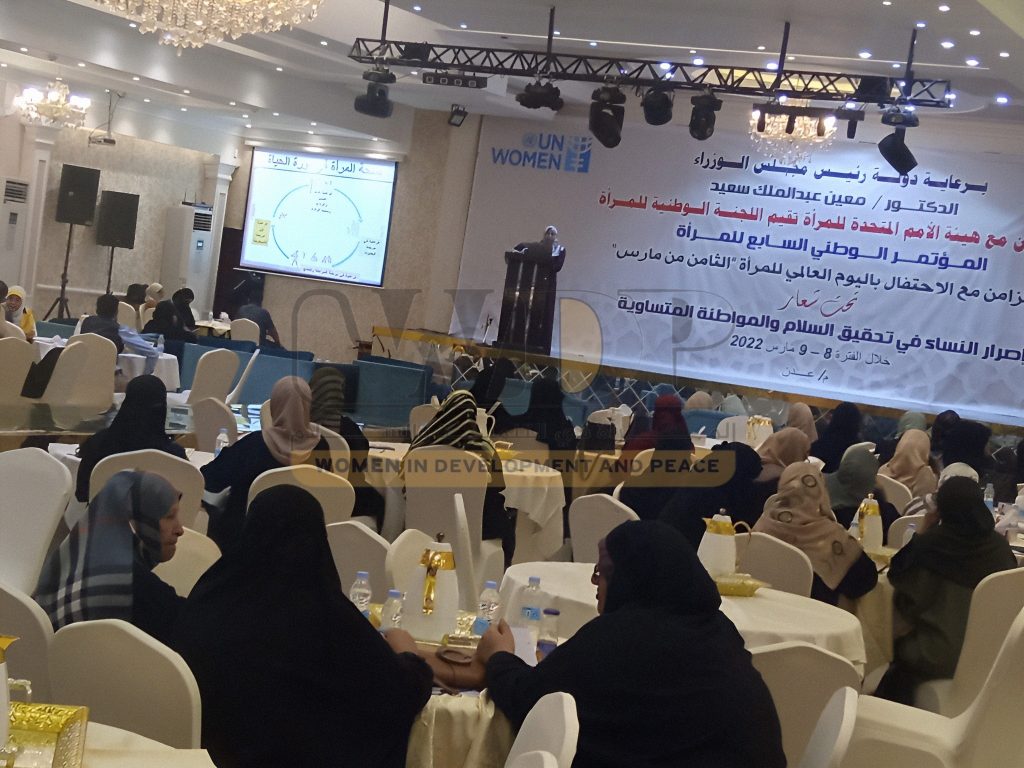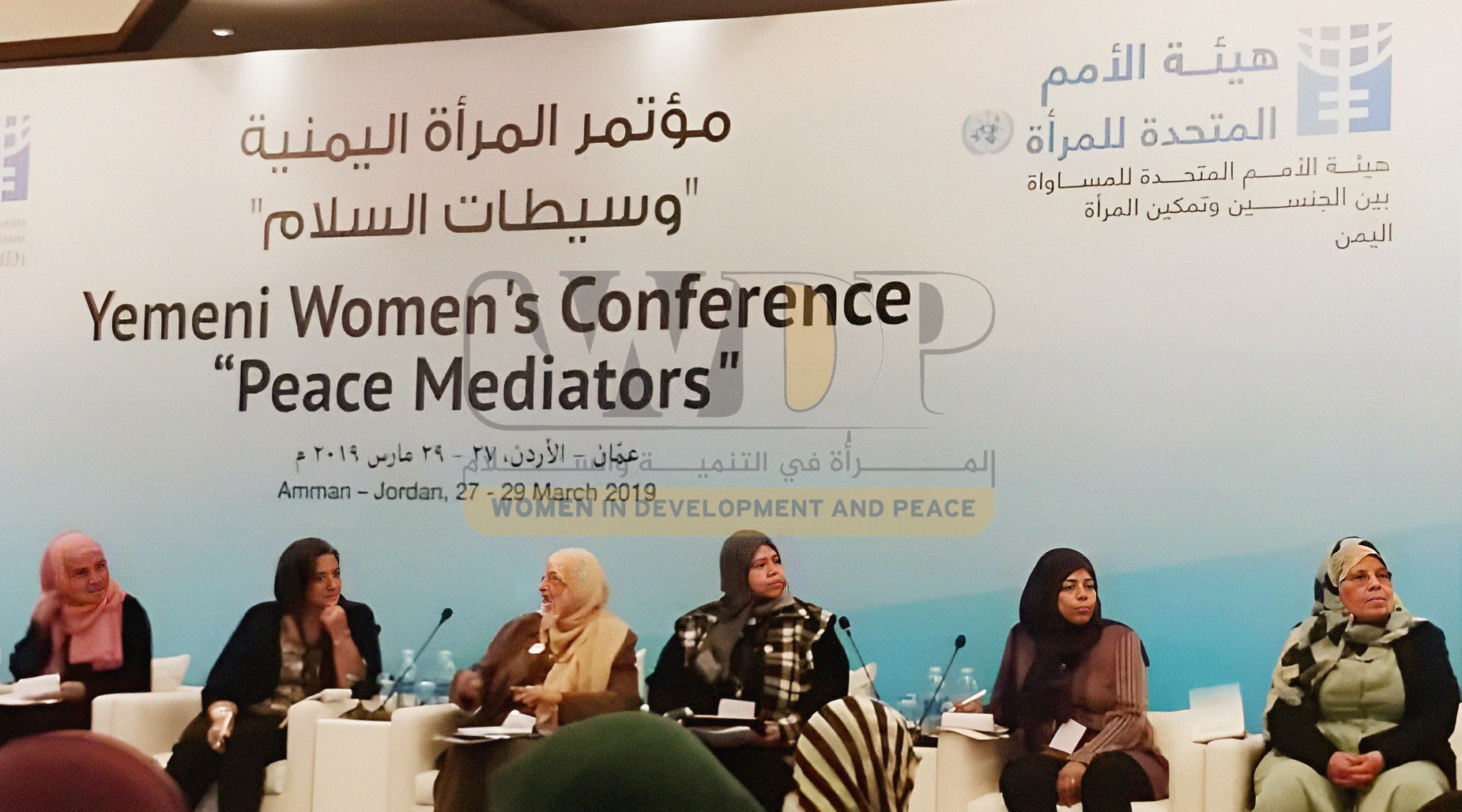Women in Development and Peace – Yasmine Abdulhafeez
The presence of Yemeni women in the political field has been a significant and influential turning point since the September 26 and October 14 revolutions. They have gradually assumed important positions in parliamentary, public, ministerial, and diplomatic roles. Women have entered the diplomatic corps for over 20 years, and Yemeni women have excelled in representing Yemen in many countries worldwide. They have become role models, inspiring future generations of girls to reach higher positions and achieve their aspirations.
Despite the remarkable achievements of women in the diplomatic field over varying periods of time, with prominent female figures demonstrating their competence and skills, the ongoing conflict in Yemen has led to a decline in women’s participation in diplomatic work. Diplomatic positions have become predominantly dominated by men, marking a clear setback from the accomplishments women have made in this field.
Nesreen Qushaima, a girl from Tihama, aspires to become an ambassador for Yemen in a foreign country or at least hold a significant position in one of Yemen’s embassies. The marginalization faced by Yemeni women has not discouraged her but rather increased her determination to prove her ability to change the reality that confined women to certain fields.
She continues, saying, “Women are like men. They have the right to aspire to achieve their legitimate goals in obtaining leadership positions, despite the difficult circumstances in the country. It is necessary to grant them the right to be appointed in all state institutions, especially in leadership and diplomatic positions, and allow them to participate in decision-making.”
Nesreen has been working in the field of wedding and event photography since graduating from university. She also documents conferences, success stories, and produces visual reports. She gained significant fame in the city of Al-Hodeidah, where she resides.
She adds, “Despite my success in the field of photography, I aspire to join the Department of Economics and Political Science and obtain an important diplomatic position in one of the embassies. This has always been my ambition, which I wanted to achieve before entering the Department of Radio and Television Arts at the Faculty of Fine Arts, Al-Hodeidah University. However, society, especially my family, rejected the idea of pursuing a diplomatic career.”
Nesreen is not the only one aspiring to work in this important and sensitive field. There are many girls in different regions of Yemen who wish to study this specialization and represent Yemen in various countries, whether through embassies, ministries, or other means.
Nesreen and other girls who hold the dream of joining the diplomatic field have been inspired by the stories of many women who have worked in this domain. They have faced challenges and obstacles that prevent women from participating in these fields, but with their determination, they have proven that women possess the courage and sufficient capabilities to qualify for leadership positions in the country.
Amat Al-Aleem Al-Soswa
Amat Al-Aleem Al-Soswa is considered one of the prominent figures who played an important and prominent role in various leadership, political, and diplomatic fields. She has made numerous contributions, achievements, and participations in various conferences, festivals, and seminars held in many Arab and international countries.
Amat Al-Aleem was born in Taiz Governorate, western Yemen, in the year 1958. She graduated from high school in 1976 and studied at the Faculty of Media, Cairo University, in the Arab Republic of Egypt in 1980. Amat Al-Aleem has held many leadership positions, starting as the chief presenter on Sana’a Television in 1991. She was appointed Deputy Minister of Information in 1997, then became the Permanent Representative of Yemen to the Organization for the Prohibition of Chemical Weapons in the Netherlands. She also served as a non-resident ambassador to the Kingdom of Sweden and the Kingdom of Denmark. In 2000, she became the ambassador to the Netherlands. In May 2003, she was appointed Minister of Human Rights, becoming the first woman to hold this position in Yemen.
Amat Al-Aleem Al-Soswa served as the Assistant Secretary-General of the United Nations and Assistant Director and Regional Director for Arab States in the United Nations Development Programme in 2006. In 2014, she was appointed Executive Director of the Executive Office for Accelerating Aid Absorption and Policy Reform.
Amat Al-Aleem Al-Soswa has been one of the distinguished Yemeni female figures who achieved wide fame within Yemen and abroad, with tangible successes in Yemeni society. She has presented many influential television programs in various fields, including politics, health, culture, and education. She also worked as a lecturer at the College of Political Science at Sana’a University.
She has participated in numerous Arab and international events, representing Yemen with distinction. This includes the 11th International Film Festival in Moscow in 1978, where she represented Yemen, and speaking on behalf of Yemen at the International Meeting on Women and Development at the United Nations General Assembly in New York in 1983. She chaired the Yemeni delegation in the meetings of the Permanent Committee for Arab Media at the Arab League in Cairo from 1991 to 1995. She also participated in the meeting of European Parliamentarians in Brussels in 1992 and attended the 12th Annual Decision Makers Conference in Washington in 2003, among other Arab and international participations.
Amat Al-Aleem has received numerous Arab and international awards, including the Woman of the Year Award in the Middle East in 2003 and the W. Averell Harriman Democracy Award in 2004. She was also honored by the United Arab Emirates for her outstanding efforts in the media field.
Jamila Ali Rajaa
Jamila Ali Rajaa is distinguished by her title as an ambassador, after serving 30 years in the Yemeni government as an actress and advisor in the diplomatic corps. She is one of the prominent Yemeni women working in the field of women’s rights. She was born in Taiz Governorate in 1958 and was the first English-speaking news anchor, as she holds a master’s degree in journalism from the American University in Cairo, and a bachelor’s degree in English literature from Cairo University.
Rajaa worked as an advisor in the Yemeni Ministry of Foreign Affairs and as a consultant to foreign missions of European governments and international organizations involved in peace efforts in Yemen. She served as an assistant to the media advisor at the Yemeni Embassy in Egypt and worked as a consultant in the peace talks in Geneva and Sweden. She was appointed as the head of the Yemeni Media Center and served as a consultant in the Yemeni Women’s Conference and Peace Mediators. She also worked as an expert in several international organizations, notably Amnesty International.
Rajaa participated in many Arab summits organized by the Arab League with the Yemeni delegation. She is also a founding member of the Yemeni Women’s Consensus for Security and Peace and participated in the women’s delegation in the Kuwait talks.
Ramziya Al-Iryani
Ramziya Al-Iryani is considered the first Yemeni diplomat to join the diplomatic corps in 1979. She was born in Ibb Governorate in 1954 and is a pioneering Yemeni novelist, writer, and human rights activist.
Al-Iryani completed her secondary education in Taiz Governorate and joined Cairo University in Egypt to study philosophy. She obtained her bachelor’s degree in 1977 and her master’s degree in Arabic literature in 1979. Additionally, she has several academic qualifications, including a diploma in political leadership, a diploma in organizing international and regional conferences and seminars, a bachelor’s degree in philosophy, sociology, and psychology from Cairo University, a diploma in management from the National Institute in Sana’a, and a master’s degree in political literature from Jawaharlal Nehru University in India.
Some of the notable positions she held include being the head of the Arab and African University Department from 1980 to 1981, head of the Gulf and Arabian Peninsula Department, and a minister plenipotentiary at the Yemeni Embassy in Tunisia. She also served as a minister plenipotentiary at the Yemeni Embassy in Washington in 1997, head of the North America Department from 1996 to 1997, and as the head of the Women’s Rights Department from 2000 to 2002.
Current Situation of Women in Diplomacy
Yemen had a small number of female ambassadors in the past; however, their roles have had a significant impact both locally and internationally. They have faced numerous challenges in entering the diplomatic field, including the stereotypical societal view that women are incapable of assuming leadership positions. Nevertheless, some women have managed to break through these barriers and achieve success in diplomatic work.
At present, there are limited appointments of Yemeni female ambassadors in various countries around the world. Despite the lack of support and empowerment, they have become an inspiring model for Yemeni women in the face of the current difficulties in Yemen.
Halima Mohammed, a social and human rights activist, says, “The current situation of women in the diplomatic corps is not different from their situation in other sectors affected by the conflict. The representation of women, compared to the past, remains very weak, especially in decision-making positions, with their roles limited to marginal administrative positions.”
She added, “Yemeni society has not witnessed the presence of women as ambassadors or deputy ambassadors for many years, except in small numbers that have not had the desired impact. Women’s work is confined to being attached to administrative offices.”
Halima believes, in her conversation with the Women in Development and Peace newspaper, that the conflict in Yemen has greatly affected women. Many qualified women have been deprived of participating in all sectors due to male dominance in decision-making and diplomatic work, and the exclusive distribution of important positions to men.
She also points out that there has been a violation of all the agreed-upon agreements, including the outcomes of the National Dialogue, which granted women the right to a participation rate of no less than 30% in all sectors. Additionally, women have been marginalized and excluded from political participation, especially in government formation, as they have not been given a share in political participation.
Halima states, “It is essential to empower women to take on roles in decision-making and diplomatic positions. It is necessary to attract qualified individuals by relying on academic and practical competencies. Previously, female diplomats achieved many accomplishments that brought success and a commendable impact to Yemen’s reality.”


